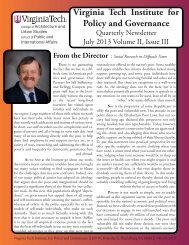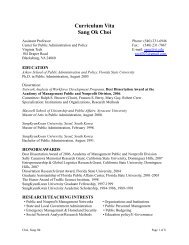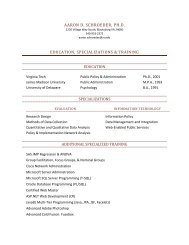1 Towards a Critical Social Theory of Philanthropy in an Era of ...
1 Towards a Critical Social Theory of Philanthropy in an Era of ...
1 Towards a Critical Social Theory of Philanthropy in an Era of ...
Create successful ePaper yourself
Turn your PDF publications into a flip-book with our unique Google optimized e-Paper software.
While some have warned aga<strong>in</strong>st such a heavy reli<strong>an</strong>ce on phil<strong>an</strong>thropy to improve social<br />
conditions, not<strong>in</strong>g that phil<strong>an</strong>thropic resources will never be sufficient to make up for<br />
government retrenchment (Boris & Steuerle 1999) or be able to be adequately distributed to<br />
areas most <strong>in</strong> need (Diaz 2002; Salamon 1992; Wolpert 1993), few have questioned the basic<br />
assumption that phil<strong>an</strong>thropy itself is unquestionably a good th<strong>in</strong>g. The result is that the social<br />
signific<strong>an</strong>ce <strong>of</strong> phil<strong>an</strong>thropy has ceased to be a political issue; we are focused not on the<br />
signific<strong>an</strong>ce <strong>of</strong> the existence <strong>of</strong> social problems, but how the policies that disguise them are<br />
delivered. This is problematic because the social problems that act as <strong>an</strong> impetus for<br />
phil<strong>an</strong>thropy--poverty <strong>an</strong>d marg<strong>in</strong>ality <strong>in</strong> particular--are not only personal issues, they are<br />
dist<strong>in</strong>ctly political (Fraser 1989; G<strong>an</strong>s 1995; Piven & Cloward 1993). The necessity <strong>of</strong><br />
phil<strong>an</strong>thropy <strong>in</strong>dicates the presence <strong>of</strong> social problems; it does not <strong>in</strong>dicate that social problems<br />
c<strong>an</strong> be elim<strong>in</strong>ated by phil<strong>an</strong>thropy.<br />
The politics <strong>of</strong> phil<strong>an</strong>thropy is further disguised when it is divorced from the fact that it<br />
c<strong>an</strong> only exist through pr<strong>of</strong>it, exploitation, <strong>an</strong>d their result, alienation <strong>an</strong>d poverty. For example,<br />
today we honor the generosity <strong>of</strong> mega-wealthy donors for try<strong>in</strong>g to solve “wicked” problems<br />
(The Economist 2004) with little or no discussion <strong>of</strong> the system that allows them to own most <strong>of</strong><br />
the wealth <strong>an</strong>d while billions <strong>of</strong> people unnecessarily live <strong>in</strong> poverty around the world (UNDP<br />
2005). Slavoj Zizek (2006) further describes this disconnect:<br />
This is what makes a figure like [phil<strong>an</strong>thropist] Soros ethically so problematic. His daily<br />
rout<strong>in</strong>e is a lie embodied: Half <strong>of</strong> his work<strong>in</strong>g time is devoted to f<strong>in</strong><strong>an</strong>cial speculations<br />
<strong>an</strong>d the other half to hum<strong>an</strong>itari<strong>an</strong> activities… that ultimately fight the effects <strong>of</strong> his own<br />
speculations. Likewise the two faces <strong>of</strong> Bill Gates: a cruel bus<strong>in</strong>essm<strong>an</strong>, destroy<strong>in</strong>g or<br />
9






